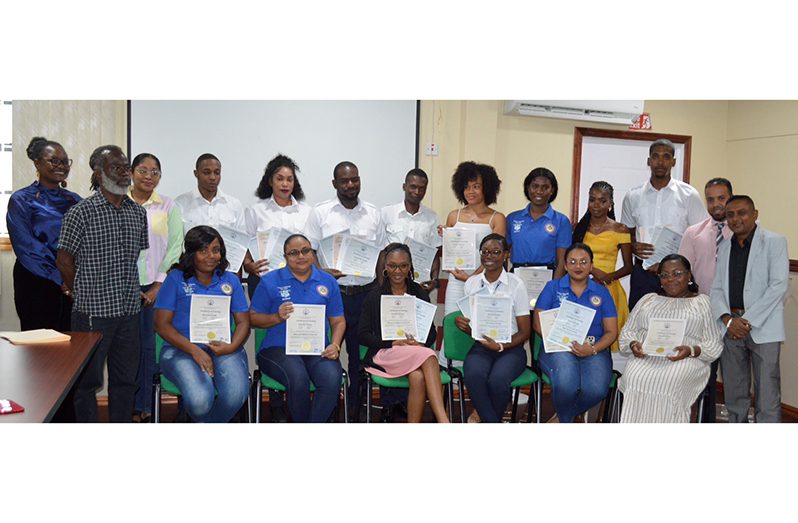ATLANTIC ALLIANCE (AA) Maritime and Offshore Training Institute (AAMOTI) recently graduated 31 Guyanese who spent the last few months pursuing certificate courses essential for the maritime and offshore sector.
Of the 31 who were graduated in two batches, 25 were scholarship recipients; 22 were females, and three were males.
Twenty scholarships were awarded through the Women in Maritime Association Caribbean (WiMAC) Guyana Chapter, while the remaining five were publicly advertised.
The ceremony was held at the Institute’s North Road Conference Room, and representatives from WiMAC, the Maritime Administration Department (MARAD), and AAMOTI were present.
The graduands were addressed by MARAD’s Registrar of Seafarers, Katina Benn, who congratulated them for persevering through some tough and sometimes fearful moments during training, but she assured them that “it will all pay off in the end, and the future is bright.”
Apart from the 25 scholarship recipients, six other students were pursuing short courses at the Institute, through MARAD. From January, those six students will begin a three-year Cadet (Engineering) programme at AAMOTI.
The graduates completed Basic Safety Training (BST) courses, Advanced Firefighting, Advanced Medical Care, and Ship Security Awareness training.
These courses and programmes are accredited by both MARAD and the Maritime Authority of Jamaica (MAJ), thereby allowing those individuals to secure employment in the maritime and offshore industry within the Caribbean and internationally.
“AAMOTI places very strong emphasis on ensuring it meets international, local and regional maritime standards so our students could benefit from opportunities anywhere in the world,” remarked Managing Director, Asif Hamid, in his charge to the graduands.
Recently, Deutsche Welle reported that the European Commission was considering banning ships registered in European Union countries from using crews of sailors from the Philippines.
The ban was being considered after an audit by the European Maritime Safety Agency found that maritime education institutions in the Philippines didn’t meet standards set by the International Convention on Standards of Training, Certification and Watchkeeping for Seafarers.
“This is why we place great importance on accreditation and affording our students the highest level of training. It is important for us that beyond the classroom, our students are able to enter those industries with ease because their qualifications are recognised,” the Managing Director said.
He added that the Institute also continues to develop its workforce to deliver high-quality service to all stakeholders and is committed to attracting the highest calibre of professionals who can make a difference in the institute and the lives of its students.
AAMOTI’s technical team comprises qualified lecturers and trainers from Egypt, Jamaica and Guyana. AAMOTI is also partnering with the Guyana Online Academy of Learning (GOAL) to offer three-year marine cadetship programmes. Already, six students are enrolled in the Marine Engineering Cadet programme through MARAD and will begin training this month.


.jpg)











